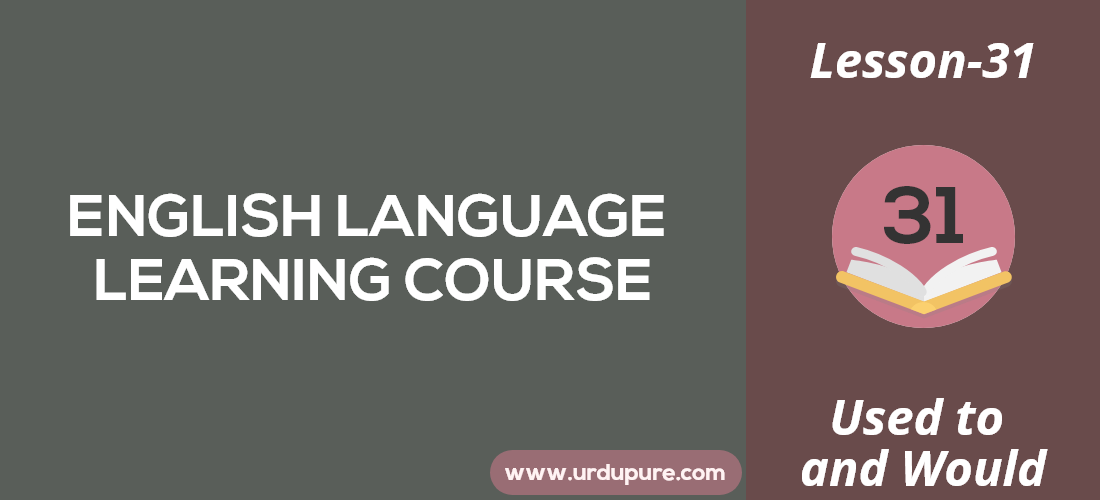Used to and Would

Used to and Would
We often commit mistakes while speaking about past time. We don't focus on the structure of the sentence and use the 2nd form of the verb in sentences to talk about the past. Well, there is not a single doubt that you have to use the 2nd form of the verb in the sentence to convey the idea of the past. But, past simple tense never emphasizes the continuous actions in the past and don't even sound clear that the action is no longer in use.
Therefore we make use of 'used to' and 'would' to describe habits, events and actions in the past that is no longer happening. However, there is a significant difference between 'used to' and 'would', which you will learn in the lesson.
Format of using 'used to' in sentences.
Affirmative sentence
Subject | Used to | Verb (1st form) | Object/ complement/ adjective |
He | Used to | Live | In India. |
Negative sentence.
Subject | Did not | Use to | Verb | Object/ complement/ adjective |
He | Did not | Use to | live | In India. |
Interrogative sentence
Did | Subject | Use to | Verb | Object/ complement/ adjective |
Did | He | Use to | Live | In India? |
Format of using 'would' in sentences.
Affirmative sentence
Subject | would | Verb (1st form) | Object/ complement/ adjective |
She | would | stop | me |
Negative sentence.
Subject | Would not | Verb | Object/ complement/ adjective |
He | Would not | Stop | Me. |
Interrogative sentence:
Would | Subject | Verb | Object/ complement/ adjective |
Would | You | Stop | Me? |
Now that you are familiar with the sentence formation of 'would' and 'used to', let's learn the usage and difference between both.
Uses of 'used to.'
1. Repeated actions or habits in the past.
You can use 'used to' to talk about repeated actions or habits in the past that no longer happen in present time.
Example:
- I used to go to play lands every Sunday when I was 12 years old. ( repeated action)
- She used to smoke. ( Habit).
- He used to play cricket every evening last year.
- we used to go swimming every weekend. ( Repeated action)
- I used to cry a lot when I was a child. ( Habit)
- She did not use to smoke.
- Did they use to play football?
2. States in the past.
The other and significant use of 'used to' is that it is used to talk about past states. It is also used with the stative verbs.
Example:
- I used to have blond hair.
- He used to live in Spain.
- She did not use to have a garden.
- Did there use to be a shopping mall?
- He used to be a guitarist.
- Did she use to be a teacher?
- I used to like action movies. (Stative verb: like)
3. Accustomed to:
The third and the most common usage of 'used to' is that it can be used to talk about the things that we are accustomed to.
Structure for such sentences is like this:
Subject + be used to+ verb-ing + object / complement/ adjective |
Example:
- I am used to making breakfasts so early for everyone, so I don't mind making for you too.
- My sister is used to sleeping early at 8.00 pm. She never wastes a minute to sleep.
Note: In negative or question statements, you don't need to change 'used to' to 'use to'. Instead, you have to use 'not' before 'used to' in negatives and are, is etc. at the start in the question statement.
Example:
- I am not used to making breakfasts so early for everyone, so I mind making for you too.
- Is my sister used to sleeping early at 8.00 pm? She never wastes a minute to sleep.
Use of 'Would'
1. Repeated actions or habits in the past.
Likewise 'used to', we can also use 'would to' describe situations or actions that were repeated again and again. It is also used to describe habits in the past that are no more a habit in the present. However, there is a significant difference between the sentence structure of 'used to' and 'would'.
The difference here is of "time frame". The time frame should always appear before 'would' and time frame should be in the past. However, the restriction of the time frame is not necessary for 'used to'.
For example, this sentence sounds natural if you use 'used to' at the beginning:
- We used to play football every weekend when we were teenagers. Now we rarely meet each other.
Now if you place 'would' in place of 'used to', this example will sound awkward and unnatural.
- We would play football every weekend when we were teenagers. Now we rarely meet each other.
But if you replace time frame after 'would' the sentence would be grammatically correct and would sound natural.
- When we were teenagers, we would play football every weekend. Now we rarely meet each other.
Example:
- When I was 12 years old, I would go to play lands every Sunday. ( repeated action)
- When my brother was five years old, he would paint for 3 hours daily.
- When I was a young and strong girl, I would go swimming every weekend.
The structure of the negative and interrogative sentence is given above, but 'would' is used in stories. It is not used in negative and question statements.
Note: 'would' is not used in past states.
The second difference between 'used to' and 'would' is that 'would' can not be used to describe past states.
Example: we can't say:
- I would live in Spain.
- I would have short hair.
2. Past probabilities or possibilities.
You can use 'would+ have to talk about the possibilities in the past.
The sentence structure goes like this:
| Subject + would+ have+ 2nd form of verb+ object/ complement/ adjective. |
Example:
- How long do you think this girl would have taken to cook 1 kg of fish?
- She would have taken 2 hours to prepare 1 kg of fish.
Conclusion:
In this lesson, you learned that 'would' and 'used to' are used to describe past habits and actions. But there is a significant difference between them. The time frame does not come in the requirement of 'used to' but the time must be described before in 'would’ sentences.
}



